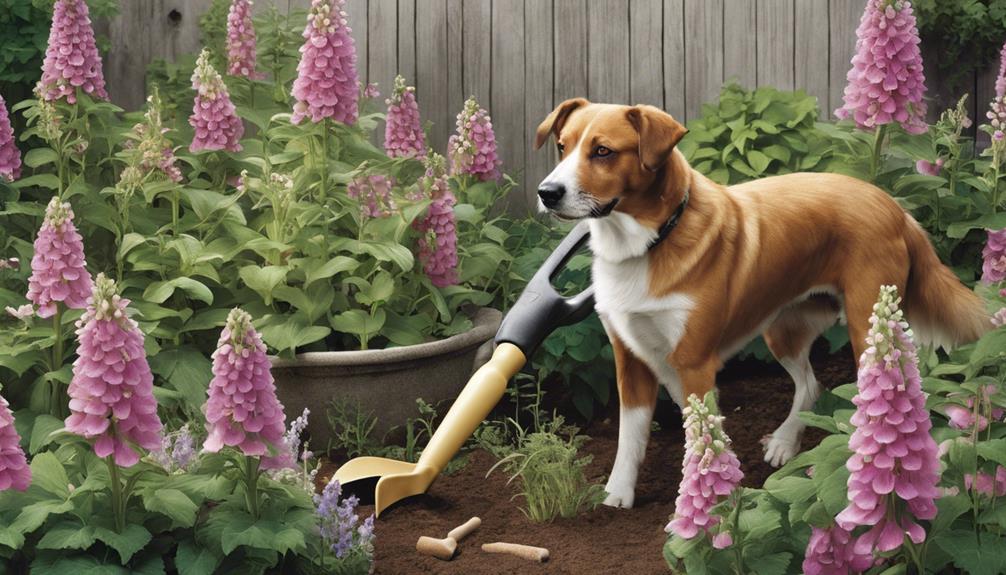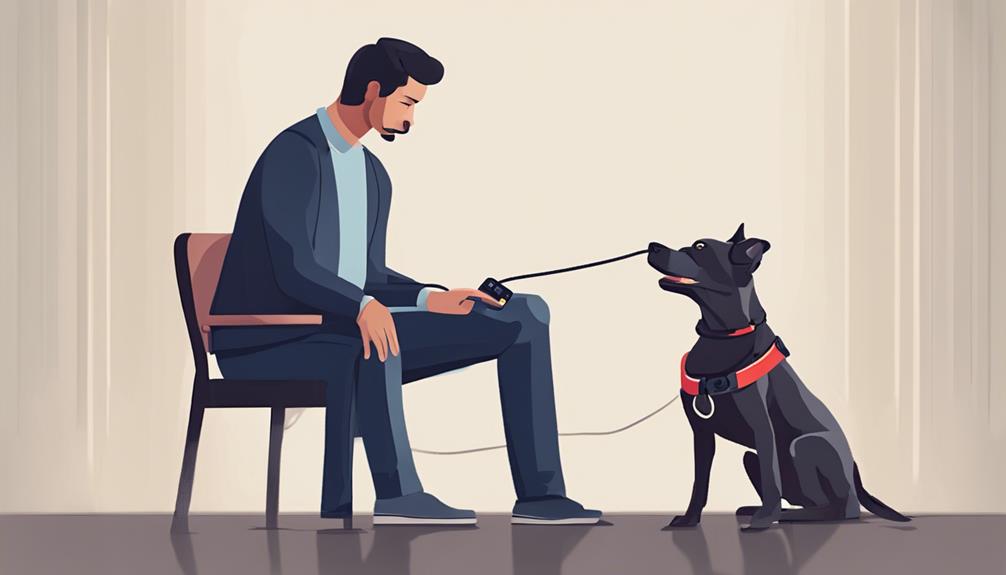Foxglove plants, which contain the toxin digoxin, can be dangerous for dogs and may lead to serious heart problems if they are consumed. Symptoms of poisoning include nausea, weakness, and abnormal heart rhythms. To ensure the safety of dogs, it is important to keep foxgloves out of their reach, educate yourself about their toxicity, and contact a veterinarian if you suspect ingestion. While digoxin has medical uses in treating heart conditions, it requires careful monitoring. If poisoning occurs, seek immediate veterinary care and avoid inducing vomiting without professional guidance. Treatment for affected dogs may involve IV fluids, medications, activated charcoal, fluids, and close monitoring of vital signs. By understanding the risks and being prepared to act quickly, you can protect your pet’s health and well-being.
Key Takeaways
- Keep foxglove plants inaccessible to dogs.
- Educate about foxglove toxicity risks.
- Act promptly with veterinary care suspicions.
- Recognize symptoms like vomiting and cardiac issues.
- Create a safe environment to minimize risks.
Foxglove Plant Genus and Species
We, as pet owners, should be aware that the foxglove plant belongs to the Digitalis genus and includes species like Digitalis capilla. This plant, with its striking finger-like structure, is native to the United States and is known for its purple variety.
However, despite its aesthetic appeal, foxglove contains a natural product called digoxin that's toxic to pets. As responsible caregivers, understanding the genus and species of the foxglove plant is essential for safeguarding our furry friends.
By recognizing the distinct features of Digitalis capilla and other Digitalis species, we can better identify and prevent potential dangers in our surroundings. Being mindful of the presence of this toxic plant can help us create a safer environment for our beloved companions.
Stay informed, stay vigilant, and together, let's promote the well-being of our pets by staying educated about plants like the foxglove.
Toxicity of Digoxin in Foxglove

Digoxin, a cardiac glycoside present in foxglove plants, poses a significant threat to dogs due to its ability to cause abnormal heart rhythms. When dogs ingest digoxin from foxglove, it can lead to life-threatening cardiac issues. This compound, derived from the foxglove plant, directly affects the heart muscle, making it a vital danger to our furry friends. Understanding the toxicity of digoxin in foxglove is essential for preventing harm to dogs.
To further highlight the impact of digoxin on dogs, let's take a closer look at the effects of this cardiac glycoside:
| Effect | Consequence |
|---|---|
| Abnormal Heart Rhythms | Can lead to serious cardiac complications |
| Cardiac Muscle Affection | Directly affects the heart, posing a fatal risk |
| Potential Life-Threatening Issues | Ingestion can result in severe health consequences |
Symptoms of Foxglove Poisoning in Dogs

Symptoms of foxglove poisoning in dogs manifest through nausea, vomiting, and cardiac irregularities. If your furry friend ingests this toxic plant, they may also show signs of weakness, tremors, and even collapse. Keep a close eye on them for dilated pupils, seizures, and abnormal heart rhythms.
Look out for gastrointestinal distress, pale gums, and lethargy as well. Recognizing these symptoms promptly is essential for seeking immediate veterinary care. If you suspect foxglove poisoning, don't wait – contact your veterinarian or an emergency animal clinic right away.
Preventive Measures for Dog Safety

To guarantee the safety of your canine companion, take proactive measures to prevent foxglove poisoning. Foxglove plants should be kept out of reach of pets at all times to avoid accidental ingestion.
It's essential to educate yourself and others about the toxicity of foxgloves to dogs. Store foxglove seeds, plants, and cut flowers in areas that are inaccessible to pets to minimize the risk of exposure. Consider planting foxgloves in locations where pets can't access them, such as elevated planters or hanging baskets.
If ingestion is suspected, contact a veterinarian immediately for guidance on the next steps to take. By being vigilant and implementing these preventive measures, you can help safeguard your furry friend from the dangers of foxglove toxicity. Remember, a little foresight and care go a long way in ensuring the well-being of your beloved pet.
Medical Uses of Digoxin

Extracted from foxglove plants, the cardiac glycoside digoxin is utilized for treating heart-related conditions in both humans and animals. This medication, first extracted in 1930, has been instrumental in managing congestive heart failure.
Digoxin, derived from the natural product found in the foxglove plant, serves as an important component in the treatment of various heart ailments. It works by helping the heart beat more effectively, making it especially beneficial for individuals with specific heart conditions.
However, it's essential to be aware that digoxin can impact kidney function and electrolyte balance in patients, necessitating careful monitoring by healthcare professionals. Regular assessments, such as monitoring heart rate with an EKG and conducting ultrasounds, are essential during digoxin treatment to guarantee its effectiveness and safety.
Understanding the role of digoxin in managing heart conditions is crucial for both patients and caregivers involved in the treatment process.
First Aid for Poisoning Cases

When dealing with potential foxglove poisoning in dogs, it's essential to seek immediate veterinary care. Carefully follow professional advice and avoid inducing vomiting without proper guidance to prevent harm.
Immediate Veterinary Care
In cases of foxglove poisoning in dogs, immediate emergency vet clinic care should be sought instead of inducing vomiting. Rushing your furry friend to the emergency vet clinic can make a life-saving difference. Activated charcoal may be administered by the vet to help absorb the toxins. Below is a table outlining why immediate veterinary care is vital for foxglove poisoning cases:
| Importance of Immediate Vet Care | Emotion Evoked |
|---|---|
| Rapid treatment saves lives | Urgency |
| Professionals provide specialized care | Reassurance |
| Prevents further complications | Security |
Induce Vomiting Carefully
Carefully administering vomiting in cases of foxglove poisoning is vital to prevent complications and guarantee the safety of the pet. Inducing vomiting should only be done under veterinary guidance to make sure it's done correctly.
It's important to mention that if a dog is already weak or showing signs of altered consciousness, inducing vomiting can be harmful and should be avoided. Professional assessment is necessary before attempting this step, as vomiting could worsen the condition in some cases.
Veterinary professionals will evaluate the situation and decide on the best course of action, which may or may not include inducing vomiting. If you suspect foxglove poisoning, seek immediate veterinary care to make sure your pet receives the appropriate and safe treatment.
Treatment Options for Affected Dogs

When a dog ingests foxglove and shows symptoms, prompt vet intervention is essential. Treatment involves supportive care measures like inducing vomiting and administering activated charcoal.
Monitoring important signs and electrolyte levels is crucial for the dog's recovery.
Quick Vet Intervention Needed
For dogs affected by foxglove poisoning, prompt veterinary intervention is essential to ensure effective treatment and recovery. When dealing with toxic plants like foxglove, time is of the essence. A quick vet intervention is necessary to assess the severity of the poisoning and start appropriate treatment.
This may include supportive therapy, activated charcoal to absorb toxins, intravenous fluids for hydration, and specific medications to counteract the effects of the poison. Monitoring the dog's heart function through an electrocardiogram (ECG) and administering necessary medications are crucial steps in the treatment process.
Depending on the severity of the poisoning, hospitalization might be necessary until symptoms subside. Remember, acting fast and seeking professional help can make a significant difference in your furry friend's recovery.
Supportive Care Measures
Supportive care measures for dogs affected by foxglove poisoning involve administering activated charcoal to help absorb toxins from their system. In veterinary medicine, intravenous fluids are essential to correct electrolyte imbalances caused by foxglove poisoning in dogs. Additional medications such as antiemetics and anti-seizure drugs may also be given to affected dogs. Blood work guides the administration of necessary medications tailored to each dog's condition. To provide thorough care, monitoring equipment and additional tests like ECG may be necessary. Here is a table summarizing the supportive care measures for dogs with foxglove poisoning:
| Supportive Care Measures | Description |
|---|---|
| Activated Charcoal | Absorbs toxins in the digestive system. |
| Intravenous Fluids | Corrects electrolyte imbalances in the body. |
| Additional Medications | Antiemetics and anti-seizure drugs as needed. |
| Blood Work | Guides medication administration based on results. |
Monitoring Vital Signs
Tracking essential signs plays a pivotal role in evaluating the overall health and response to treatment of dogs affected by foxglove poisoning. Monitoring heart rate, rhythm, and blood pressure is essential to evaluate cardiac function and detect signs of heart failure.
Observing respiratory rate and effort helps identify any breathing abnormalities that may indicate worsening condition. Regular temperature checks aid in evaluating health status and identifying potential infections.
Assessing hydration status through skin turgor, mucous membranes, and urine output is crucial for managing fluid balance and kidney function. Monitoring neurological signs such as consciousness level, reflexes, and coordination is important to track the central nervous system effects of foxglove poisoning.
These measures are essential in ensuring the well-being of dogs affected by this toxin.
Recognizing Foxglove Poisoning Risks

To recognize foxglove poisoning risks in dogs, observe for symptoms such as nausea, tremors, weakness, and cardiac issues. If your dog has ingested any part of the foxglove plant, it's vital to be vigilant for signs of poisoning.
Nausea may manifest as drooling or vomiting, while tremors can be observed through shaking or unsteadiness. Weakness might show as reluctance to move or lethargy. In severe cases, cardiac issues like abnormal heart rhythms or even collapse can occur.
Remember, immediate veterinary intervention is necessary when these symptoms of poisoning are present. Foxglove toxins can act rapidly and have serious consequences if left untreated. Being aware of these signs and acting promptly can make a significant difference in your pet's well-being.
Stay alert and seek help from a professional if you suspect your dog has been exposed to foxglove, ensuring the best chances for a positive outcome.
Safety Steps for Pet Owners

To protect our pets from foxglove poisoning, it's essential to keep these toxic plants out of their reach. Foxglove is extremely harmful to dogs and can lead to severe health issues if consumed.
If your dog has been exposed to foxglove or is displaying symptoms of poisoning such as vomiting, diarrhea, weakness, or irregular heartbeat, it's important to seek immediate veterinary care. Familiarize yourself with the signs of foxglove poisoning in dogs, so you can act promptly in case of an emergency.
When dealing with foxglove, remember to wear gloves to safeguard yourself and prevent accidental exposure to your pets. Consider planting foxgloves in areas that are inaccessible to pets and children to guarantee their safety.
Protecting Dogs From Harm

Let's guarantee the safety of our canine companions by taking proactive measures to protect them from harm. One vital step is to keep foxglove plants out of reach of dogs to prevent accidental ingestion.
Educating ourselves and others about the toxic nature of foxgloves is essential in safeguarding our furry friends. If you suspect your dog has ingested foxglove, promptly contacting a veterinarian is paramount. Being aware of the symptoms of foxglove poisoning in dogs, such as vomiting and cardiac issues, can help in early detection.
If your dog shows any signs of foxglove poisoning, take immediate action and seek veterinary help without delay. By staying vigilant and informed, we can create a safer environment for our beloved pets and minimize the risks they face.
Frequently Asked Questions
Can Dogs Be Around Foxgloves?
Yes, dogs shouldn't be around foxgloves. Foxgloves are toxic to pets due to cardiac glycoside toxins present in them. Ingesting any part of the plant can lead to severe health issues in dogs, such as nausea, vomiting, and heart problems.
To protect our furry friends, it's crucial to keep foxgloves out of their reach to prevent accidental ingestion. Remember, safety first when it comes to our pets' well-being.
How Do I Protect My Dog From Poisonous Plants?
To protect our furry friends from poisonous plants, keep them out of reach. Educate yourself and others on plant toxicity. Opt for pet-safe alternatives in the garden. Store plants securely. If ingestion is suspected, seek immediate veterinary help.
Anachronism: Let's be paw-sitive and safeguard our pups! With these steps, we can create a safe environment and enjoy our gardens worry-free.
What Should I Do if My Dog Eats Foxglove?
If your dog eats foxglove, don't induce vomiting and seek immediate veterinary help. Symptoms of foxglove poisoning in dogs include dizziness, lethargy, vomiting, and cardiac issues.
Emergency vet clinic visits are necessary for proper diagnosis and treatment of foxglove ingestion. Removing any plant particles from the dog's mouth and providing vital care are essential steps.
Treatment for foxglove poisoning may involve blood work, EKG monitoring, ultrasound, gastric lavage, and IV fluid therapy.
Is It OK to Touch Foxglove?
Yes, it's okay to touch foxglove, but caution is essential. Foxglove plants can cause skin irritation and allergic reactions when touched. To protect yourself, wear gloves and avoid direct contact with the toxic compounds.
If you have sensitive skin or a history of plant-related reactions, it's best to steer clear. Remember to wash your hands thoroughly after handling foxglove to minimize the risk of skin issues.
Should I Be Concerned About Morning Glories Poisoning My Dog if Foxglove is Already a Threat?
Yes, morning glories and dogs safety is a concern if foxglove is already a threat. Morning glories can be toxic to dogs if ingested, causing symptoms like vomiting, diarrhea, and lethargy. It’s important to keep an eye on your dog when around these plants and contact a veterinarian if any concerning symptoms occur.
Conclusion
To summarize, it's vital for pet owners to be aware of the dangers of foxglove poisoning in dogs. By understanding the toxicity of digoxin found in foxglove plants and recognizing the symptoms of poisoning, steps can be taken to prevent harm to our furry friends.
Remember to always keep foxglove plants out of reach and seek immediate veterinary care if you suspect your dog has ingested any part of the plant. Protecting our pets is a responsibility we must take seriously.









